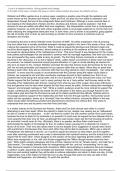Essay
Paradise Lost and Duchess of Malfi Comparison essay - Love
This essay explores the theme of 'true love' between Adam and Eve, the Duchess and Antonio, comparing it to the obsessive love depicted by Satan and Ferdinand. This essay was marked a 29/30 so it is a good exemplar to compare your own essay and structure to
[Show more]













